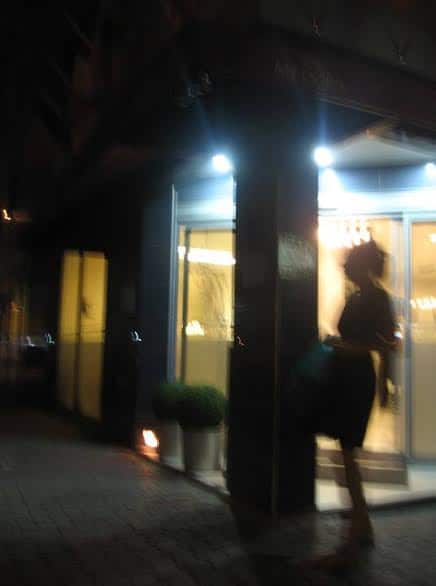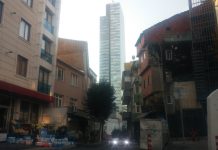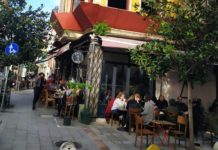 They were three sisters and they had all grown up together in a small town in the south of Turkey. The oldest, and the most beautiful, was named Meltem. Like her name, Meltem had also been the wildest in her youth, a man-eater. The second oldest, Pelin, was energetic and ambitious. She was the “successful” one. Then there was Hülya, the youngest, who was “artistic” and somewhat withdrawn around others.
They were three sisters and they had all grown up together in a small town in the south of Turkey. The oldest, and the most beautiful, was named Meltem. Like her name, Meltem had also been the wildest in her youth, a man-eater. The second oldest, Pelin, was energetic and ambitious. She was the “successful” one. Then there was Hülya, the youngest, who was “artistic” and somewhat withdrawn around others.
A few years before this story begins, the three sisters had made a pact: each of them would go somewhere in the world (like most young people they dreamed of living abroad), live and study for a year. In the end, they would all reunite in Istanbul, get married and settle down for the rest of their lives.
Meltem went to London to study English at a language school. It was while she was there that she met a Turk by the name of Fatih, who was also studying English. Amazingly, Meltem, the stormy, man-eating beauty fell for Fatih, and they returned to Turkey and got married. Pelin went to New York. There she found the city most agreeable to her ambitious nature; she found a job with an international firm, with great pay and benefits, and landed a high-rise apartment in Brooklyn.
Hülya decided on Paris, but of the three sisters was really the least willing to go. It was decided, given her “artistic bent,” that she could practice her French and enroll in a drawing class. These plans didn’t exactly pan out. Instead, she found herself working in a cafe near the Boulevard de Montparnasse, and for awhile had a boyfriend from Sweden who was studying at one of the universities.
After the year ended, she decided to go back, to find work and settle in Istanbul, but the Swedish guy wasn’t up for it. So she left the cafe, and the Swede, behind and went to Istanbul, which is where this story begins.
****
The parents weren’t exactly crazy about their youngest daughter living in Istanbul, and would have preferred she return home. But over Skype discussions with Meltem it was understood that she and Fatih would “look after” Hülya – she wouldn’t be entirely alone. In a burst of maternal generosity, the mother flew up to the city, helped Hülya find a small studio apartment in Kadıköy, and even bought some furniture, including a king-sized bed, a cream-colored sofa and an easel, so that she could perhaps do some painting.
With these arrangements made, the mother returned to southern Turkey.
****
It was strange being back in Turkey. One of the reasons Hülya had tired of Paris was that she grew tired of being a foreigner, the constant looks and banal, even outrageous questions (“So do they have camels in Turkey?” was her favorite).
But living in Istanbul, she also felt herself an outsider. Meltem and Fatih were busy with their connubial bliss – when they weren’t fighting anyway – and she seldom saw them, except at occasional dinners. Having lived in Paris, she had grown accustomed to big city life – the crowds, the traffic, the incessant noise – but the loneliness she had felt in Paris she could easily chalk up to being a foreigner. Here in Istanbul, with its own particular sway, she felt a keen disappointment creeping in along with her loneliness. There was a mingling fear that life was passing her by, especially when she read Pelin’s Facebook posts, seeing her posing with Adele after a concert, or crossing the Brooklyn bridge with her latest boyfriend.
Sometimes, when she went for walks in Moda, or took a ferryboat ride over to Beyoğlu, Hülya thought of the promise the three of them had made, about them all settling down together one day. But she knew now it was never going to happen. Pelin, for one, was far too happy and successful with her life in New York to ever think of returning home, except for family visits (she’d attended Meltem’s wedding, for instance).
Occasionally, with some bitterness, she imagined she was living Pelin’s life in New York, and she tried to see herself at the high-ball hour at some posh club, or attending a splashy exhibition at the Guggenheim. But generally, Hülya was too self-contained to entertain such petty jealousies for very long. She’d laugh at herself, and move on. After all, she’d always have Paris.
In the autumn, about three months after her arrival in Istanbul, Hülya found a job working at a small gallery near Taksim. It didn’t pay that well, but she was able to supplement this income by giving French lessons, and so it was enough to get by.
****
One afternoon, when she arrived home from the gallery, Hülya saw there was a cat sitting on the balcony. How it had got there she didn’t know, since her flat was three stories up. It was one of the orange-brown tabby varieties that can be found all over Istanbul.
Hülya liked cats, and for something to do, she got a paper shopping bag and put it on the floor. The cat, drawn by the bag, came in off the balcony and, curiously, tentatively, eyed the bag and then finally disappeared inside it. They played this “bag game” together for several minutes, and then Hülya went to the kitchen, got some tuna from a can and fed it to the cat.
Over the next few days, she grew used to having the cat around, and decided to name it Claude, after the French impressionist Monet. It was a girl cat so she got in the habit of calling her Claudia instead.
Claudia took to sleeping in her bed, scratching and clawing Hülya’s feet in the early morning hours to let her know that it was time to be fed. In the evenings after she came home from the gallery or from lessons, the two of them would play games on the floor of the living room. All in all, it was an amiable relationship, consisting of the basic idea that they were both lonely and in need of company. Istanbul produces many such relationships; expedient, surrogate, substitute.
****
Anyway, the dreams began, or something like dreams – panoramic visions, delusions, raptures. Hülya would have these dreams where a woman was in the apartment, walking around. Skulking around would be a better way to put it, skulking around with heavy, languid steps that echoed in the empty rooms. In her dreamy half-awake state, usually sometime near sunrise, Hülya would swear she could hear the heavy footsteps in the living room. Once she even thought she saw a form, a youngish woman wearing a shawl, pass through the hall on the way to the kitchen.
There were other dreams too; grotesque fantasies in which she found that Pelin had died in some gruesome fashion (a car wreck, a Central Park slasher, etc); or dreams that something had happened to Meltem and Fatih.
When she awoke, there would be the cat, Claudia, sitting on the edge of the bed, staring, regarding her with its twitching ears and gleaming cat eyes. Sometimes, awaking to see the cat regarding her, she was startled. In her heightened state, she found herself imagining the cat was possessed, or was possessing her; that the cat was a harbinger, a horla, that had blown into Istanbul on some evil, tropical wind to take possession of her soul.
So one Saturday, she got up and took the cat on a bus across town to an animal shelter, where she dropped it off.
****
Meltem came by later the next afternoon for a visit.
“Are you OK?” she asked Hülya, seeing that her sister looked pale, tired.
“I just haven’t been sleeping well lately,” Hülya answered.
“Maybe you just need a boyfriend,” Meltem said. “You spend too much time by yourself.”
Hülya confided in her sister. She told her of the strange visions she had been seeing, of the woman with the shawl and the violent dreams. Meltem listened with sympathy, knowing her sister had always been highly sensitive and imaginative.
“I think you’re just a little freaked out by living on your own,” Meltem said. “If you want, you can come and stay with us for awhile, if that would help.”
“Thanks,” Hülya said. “But I think I’m all right. Plus, you guys wouldn’t want me around all the time.”
“Oh, come on!” Meltem said. “Seriously, it wouldn’t be a problem at all.”
“No, it’s all right,” Hülya said. “You’re probably right. It’s just nerves. It’ll pass.”
****
That evening, Hülya stayed up late reading, and it was past midnight before she finally fell asleep. Outside, it had begun to rain, a steady, persistent rain. In a flash, she awoke to hear insistent rapping on the window. She got up, terrified, and slowly went to investigate. But upon opening the curtain and looking out, there was nothing but the quiet streets below.
Hülya shivered with an unknown terror beating in her chest. She went back to bed, pulled the covers up, and tried to sleep. From somewhere, she could hear different sounds, this time coming from the balcony.
“Hiss! Siktir git!” she whispered, shivering under the covers. “Please go away. Please go away.”
At length she rose again and went to the window, half expecting to see Claudia there. But still, there was nothing, except the sound of the rain.
James Tressler, author of “Conversations in Prague,” and “The Trumpet Fisherman and Other Istanbul Sketches,” is a writer and teacher. He lives in Kadıköy.
What are Letters from Istanbul?
Istanbul is a million villages woven, one might even say, thrown together, rather than a single vast city. The city is best understood by understanding little bits at a time, one person at a time. It is a city that defies perspective, for it is constantly shifting. It is an endless parade of street musicians playing simple, overlapping melodies, rather than a symphony orchestra striking a single majestic chord; it is an intricate mosaic rather than a grand oil portrait, the pieces of the mosaic each giving meaning and sustenance to the whole.
All that sounds a bit high-flown, I know. But to paraphrase James Joyce, the universal lies within the particular. So, that’s the intent of these Letters: to gather up those mosaic tiles one at a time, and to find the little stories that fall between the cracks. Hopefully the pieces of that mosaic will add up to an interesting portrait of this city a lot of us call home.










